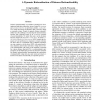Free Online Productivity Tools
i2Speak
i2Symbol
i2OCR
iTex2Img
iWeb2Print
iWeb2Shot
i2Type
iPdf2Split
iPdf2Merge
i2Bopomofo
i2Arabic
i2Style
i2Image
i2PDF
iLatex2Rtf
Sci2ools
130
click to vote
AAAI
2012
2012
A Dynamic Rationalization of Distance Rationalizability
Distance rationalizability is an intuitive paradigm for developing and studying voting rules: given a notion of consensus and a distance function on preference profiles, a rationalizable voting rule selects an alternative that is closest to being a consensus winner. Despite its appeal, distance rationalizability faces the challenge of connecting the chosen distance measure and consensus notion to an operational measure of social desirability. We tackle this issue via the decisiontheoretic framework of dynamic social choice, in which a social choice Markov decision process (MDP) models the dynamics of voter preferences in response to winner selection. We show that, for a prominent class of distance functions, one can construct a social choice MDP, with natural preference dynamics and rewards, such that a voting rule is (votewise) rationalizable with respect to the unanimity consensus for a given distance function iff it is a (deterministic) optimal policy in the MDP. This provides an ...
| Added | 29 Sep 2012 |
| Updated | 29 Sep 2012 |
| Type | Journal |
| Year | 2012 |
| Where | AAAI |
| Authors | Craig Boutilier, Ariel D. Procaccia |
Comments (0)

